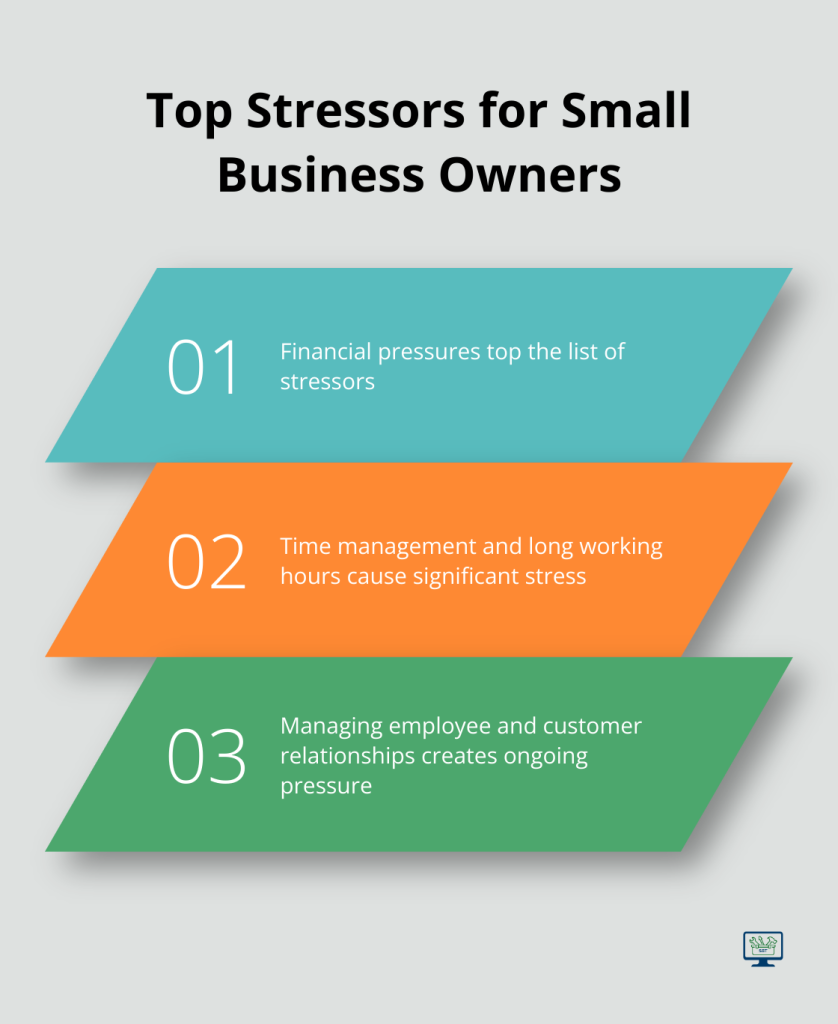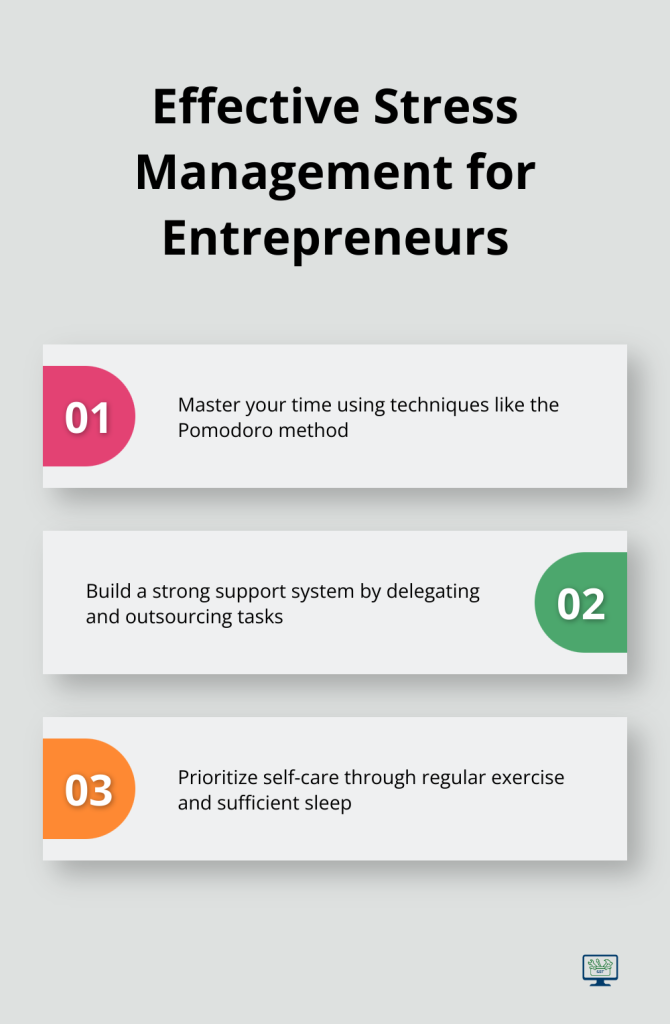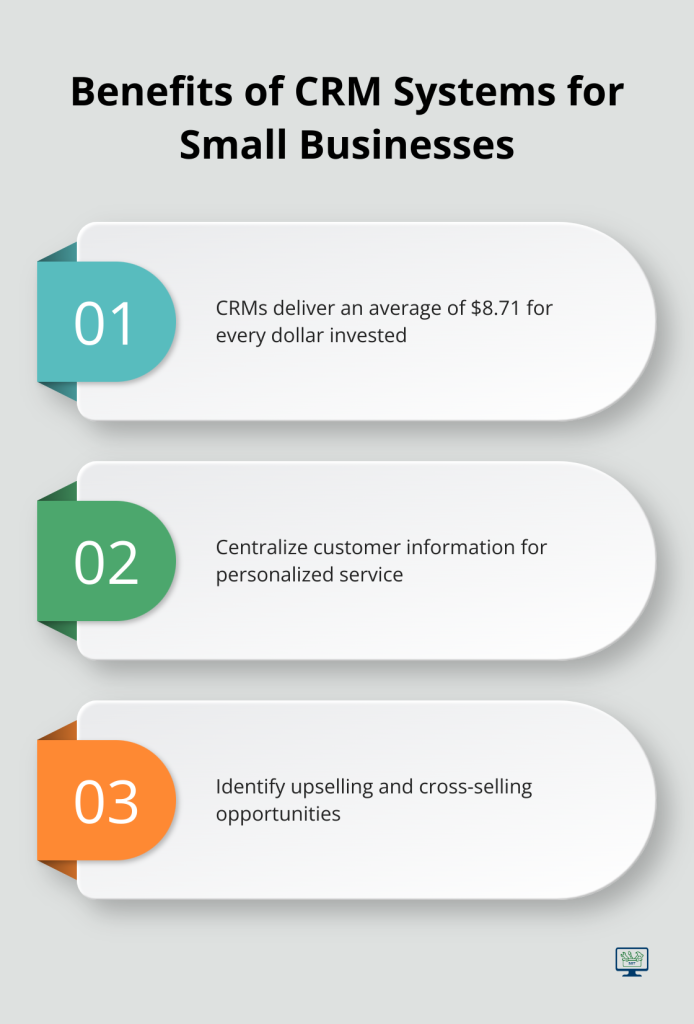Running a small business can be incredibly rewarding, but it often comes with a hefty dose of stress. As entrepreneurs juggle multiple responsibilities, the pressure can quickly become overwhelming.
At SmallBizToolbox, we understand the unique challenges faced by small business owners. That’s why we’ve compiled a comprehensive guide to stress management techniques tailored specifically for entrepreneurs.
What Stresses Small Business Owners Most?
Small business owners face unique challenges that can lead to significant stress. Understanding these stressors is the first step in developing effective coping strategies.
Financial Pressures: The Top Concern
Financial worries top the list of stressors for small business owners. This highlights the growing financial pressure on entrepreneurs.
Cash flow management presents particular challenges. Late payments from clients, unexpected expenses, and fluctuating revenue can create a perfect storm of financial stress. To mitigate this, implement strict payment terms, maintain an emergency fund, and review your financial statements regularly.
Time Management: The Constant Juggling Act
Small business owners often work longer hours than the average employee. According to a study, entrepreneurs work long hours compared to employees in other sectors. This extended workweek can lead to burnout and negatively impact work-life balance.
To combat this, use time-blocking techniques. Allocate specific time slots for different tasks and stick to them. Don’t hesitate to delegate tasks where possible.
Employee and Customer Relationships: A Delicate Balance
Managing employees and maintaining customer satisfaction are crucial yet stressful aspects of running a small business. High employee turnover can be costly and time-consuming, while losing customers can significantly impact your bottom line.
To address these challenges, create a positive work culture and implement regular feedback sessions with both employees and customers. This proactive approach can help identify and resolve issues before they escalate.
Competitive Market Pressures
In today’s fast-paced business environment, staying ahead of the competition can be a significant source of stress. Small business owners must constantly innovate and adapt to changing market conditions (often with limited resources).
Try to stay informed about industry trends and competitor activities. Conduct regular market research and use this information to refine your business strategy. Consider joining industry associations or networking groups to gain valuable insights and support.
The next section will explore effective stress management techniques that small business owners can employ to tackle these common stressors head-on.

How Can Entrepreneurs Manage Stress Effectively?
Small business owners face unique challenges that can lead to significant stress. We’ve gathered practical strategies to help entrepreneurs manage stress effectively and maintain their well-being.
Master Your Time
Time management reduces stress. Identify your most productive hours and schedule important tasks during these periods. Use the Pomodoro Technique: work in 25-minute focused bursts followed by short breaks. This method increases productivity and reduces burnout.
A Harvard Business Review study found that entrepreneurs who used time-blocking techniques reported a 20% increase in productivity. Dedicate specific time slots to different tasks, such as client communication, financial review, and strategic planning.
Build a Strong Support System
Delegating responsibilities is essential for managing stress. Identify tasks that others can handle and invest time in training your team. This reduces your workload and empowers your employees.
Consider outsourcing non-core functions. For example, using AI-driven content creation tools (like those offered by SmallBizToolbox) can save time on marketing tasks, allowing you to focus on strategic business decisions.
Prioritize Self-Care
Physical health directly impacts stress levels. A Journal of Occupational Health Psychology study found that entrepreneurs who exercised regularly reported 20% lower stress levels than those who didn’t.
Incorporate exercise into your routine, even if it’s just a 30-minute walk during lunch. Try to get 7-8 hours of sleep per night. Poor sleep impairs decision-making and increases stress.
Nutrition plays a crucial role. A balanced diet rich in omega-3 fatty acids (found in fish and nuts) can help reduce stress hormones in the body.
Practice Mindfulness
Mindfulness techniques significantly reduce stress. A Journal of Business Venturing study found that entrepreneurs who practiced mindfulness for just 10 minutes a day reported a 35% decrease in stress levels after eight weeks.
Try apps for guided meditation sessions. Even simple deep breathing exercises help. Practice the 4-7-8 technique: inhale for 4 seconds, hold for 7, and exhale for 8.
Set Realistic Goals
Unrealistic expectations are a major source of stress. Break down large goals into smaller, achievable milestones. This ‘small wins’ strategy boosts motivation and reduces feelings of being overwhelmed.
Teresa Amabile at Harvard Business School found that recording small achievements daily led to more positive emotions and higher motivation at work.
Use project management tools to track progress and celebrate these small wins. This not only reduces stress but also provides a clear picture of your business’s growth over time.
Now that we’ve explored effective stress management techniques, let’s look at how technology can further alleviate the pressures of running a small business.

How Tech Tools Can Lighten Your Workload
Streamline Operations with Project Management Software
Project management software transforms task handling and team collaboration. Over 88% of organizations are using project management software, reflecting a shift towards more digitalized and efficient processes. These tools track progress, set deadlines, and assign tasks efficiently.
Popular options include Asana, Trello, and Monday.com. They offer features like Gantt charts, task dependencies, and time tracking. Centralized project information reduces miscommunication and aligns everyone on goals and deadlines.
Simplify Financial Management
Financial management often stresses small business owners. Accounting software alleviates this burden by automating many tasks.
Tools like Xero and QuickBooks Online provide automated bank reconciliation, invoice generation, and financial reporting. These platforms integrate with bank accounts and other business tools, offering a real-time view of financial health.
Enhance Customer Relationships
Customer Relationship Management (CRM) systems maintain strong customer relationships and drive sales. A study found that CRMs deliver an average of $8.71 for every dollar invested.
Platforms like Salesforce and HubSpot CRM track customer interactions, manage leads, and analyze sales data. Centralized customer information enables more personalized service and identifies upselling or cross-selling opportunities.
Automate Repetitive Tasks
Automation frees up significant time by handling routine tasks. McKinsey reports that 45% of paid activities can be automated using current technologies. This translates to more time for strategic thinking and business development.
Tools like Zapier create workflows that connect different apps and automate tasks. For example, you could automatically add new email subscribers to your CRM or create tasks in your project management tool when you receive a new order.
Improve Team Communication
Effective communication propels small business success. Platforms like Slack and Microsoft Teams significantly improve team collaboration. A study by Slack found that teams using their platform see a 32% increase in productivity.
These tools offer instant messaging, file sharing, and video conferencing (often integrating with other business tools). They create a central hub for all your team’s communication and collaboration needs.

Final Thoughts
Running a small business challenges entrepreneurs, but effective stress management techniques can help you thrive. We explored strategies to tackle common stressors, from time management to self-care and technology use. These approaches reduce the pressures of business ownership and contribute to long-term success.
Small business owners should start with one or two stress management strategies and incorporate them into their daily routines. As positive results emerge, additional techniques can be added to create a comprehensive stress management toolkit. This gradual approach ensures sustainable changes in both personal well-being and business operations.
SmallBizToolbox supports Australian entrepreneurs with tools to streamline operations and boost online presence. Our platform offers AI-driven content creation and SEO optimization to help grow your business efficiently. Explore our services and take advantage of our free 7-day trial to focus on what matters most – growing your business while managing stress effectively.
How useful was this Resource?
Click on a star to rate it!
Average rating 0 / 5. Vote count: 0
No votes so far! Be the first to rate this post.
We are sorry that this post was not useful for you!
Let us improve this Resource!
Tell us how we can improve this Resource?




